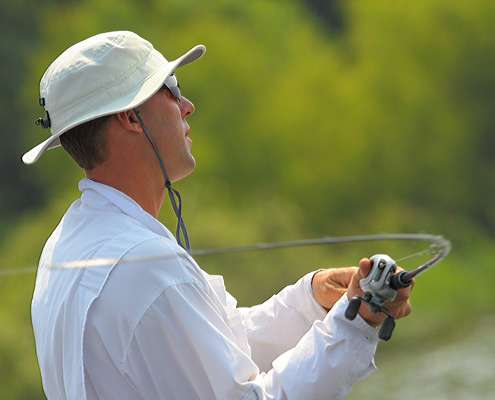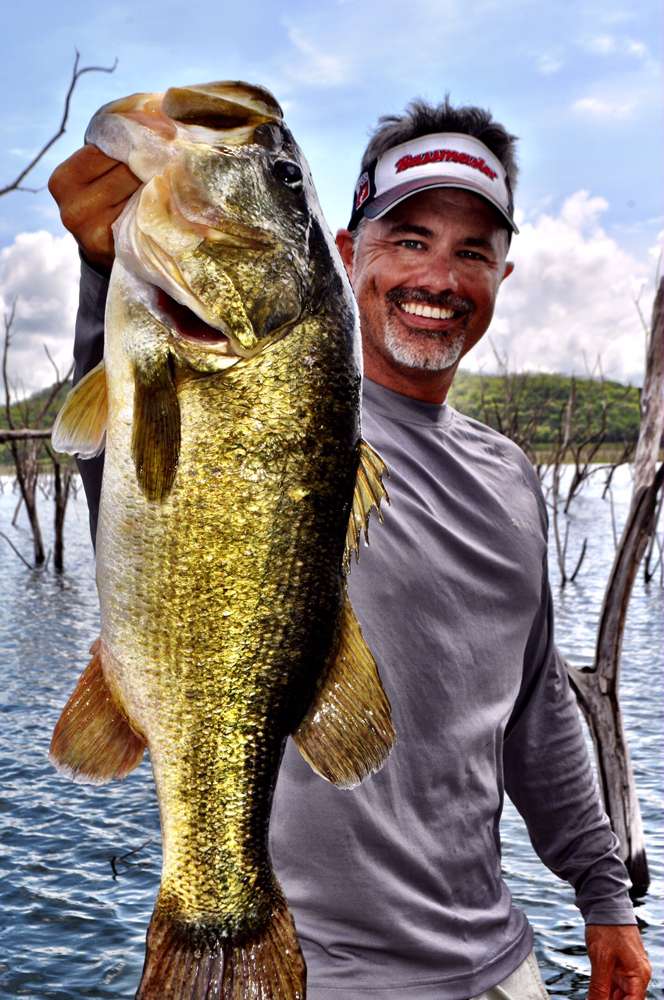
LITTLE ROCK, Ark. — I would have moved.
After watching Aaron Martens probe every rock of a jetty point for over an hour without a bite during the Arkansas River Elite event, all I could think about was moving. Why doesn’t he move?!
Part of my question likely had something to do with the stifling Arkansas heat. I believe the air temperature climbed to 99 that day, and there was not a breath of wind to be found.
But there Martens sat, literally on occasion, patiently casting his drop shot within inches of the rocky shoreline, lightly twitching a 4-inch Roboworm, hoping life would eventually appear.
An hour and a half, four Gatorades and two sweat-drenched towels into watching this grueling act, my question was answered. Martens set the hook on a fish that more than doubled-over his flimsy rod. He played it from the front of the boat to the back, then back to the front. It jumped. It was a giant river largemouth!
Eventually, it tired and Martens lipped it boat side. It would weigh 4 ½ pounds and eventually anchor his second-place finish in the 2011 Diamond Drive.
“I knew he was there!” Martens exclaimed, Cheshire grin slathered across his face.
And that was the foundation of his patience. That is why all anglers at the Elite level make decisions that oftentimes baffle the weekend angler. Their confidence, bred by knowledge gained from countless hours on the water, allows them to “know” where bass are.
And Martens even took it a step further … he knew how MANY fish were on that spot.
“There are, like five bass on this point. I knew one would eventually bite, I just had to wait him out,” the Alabama pro said.
His confidence on this particular point, the reason he knew the bass were there, came from a flurry of action he encountered on Day 2 of the tournament. I was watching him the moment he switched to his drop-shot rig. It wasn’t three casts later he hooked his first fish. Then he put on a clinic, quickly boating a 12-pound limit that put him near the top of the leaderboard.
But the final day of competition was different. The fish weren’t biting, it was hot and the current was almost completely absent.
“I hate fishing this slow,” Martens said, “but it’s the only way to catch fish when they quit eating. It’s silly to leave fish to try and find fish. If you know the bass are there, you have to be willing to make 100 casts to the same rock to get one to bite.”
And he did just that. I’d be surprised if there was a single rock on that entire point that didn’t get knicked by his diminutive drop-shot weight. He would work the point at a snail’s pace, and then move up river to hit another rocky bank for an hour, and then return back to his point.
“Remember, we have, like, eight hours to fish. We only have to bring in five fish,” Martens said. “So you don’t have to freak out if you don’t catch a bass after an hour of casting. You just need to know that you are casting to the right group of fish to win. And I believed I was.”

